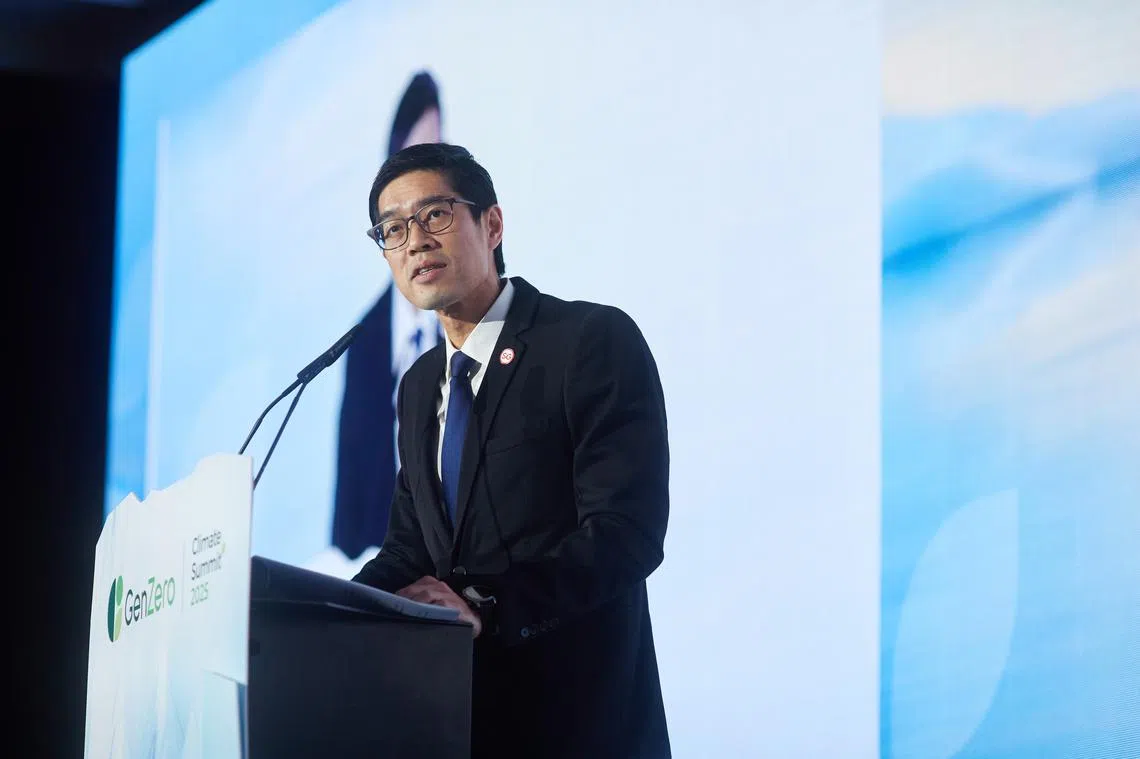More seed funding for carbon projects as Singapore overcomes climate paralysis: EDB, MTI
EDB’s Carbon Project Development Grant has been awarded to three project developers – 3Degrees, Climate Bridge and The Nature Conservancy

[SINGAPORE] To bridge the financing gaps in scaling up carbon markets, Singapore government agencies are mobilising more capital to support early-stage projects that require high upfront costs.
This includes a new donor-advised fund launched by the Singapore Economic Development Board (EDB) and TT Foundation Advisors (TTFA), the philanthropy advisory arm of Temasek Trust.
This was announced by EDB managing director Jermaine Loy at the GenZero Climate Summit Insights on Monday (May 5), the first day of Ecosperity Week 2025.
Managed by TTFA, the new fund will unlock capital from family offices and foundations for projects that generate high-integrity Article 6 carbon credits under EDB’s Carbon Project Development Grant. Article 6 of the Paris Agreement sets out how countries can pursue voluntary cooperation to reach their climate targets.
Speaking at the event held at the Sands Expo and Convention Centre, Loy noted a “strong momentum” as more private capital owners come onboard, and welcomed those who share the vision to join hands.

To date, S$20 million has been secured to co-fund the development of high-quality carbon projects, and several family offices are in discussions with EDB and TTFA.
Navigate Asia in
a new global order
Get the insights delivered to your inbox.
“Whether it is to support climate mitigation efforts domestically or regionally, Singapore stands ready to work with like-minded partners. We believe that through these collaborations, we can turn moments of paralysis into decisive climate actions,” said Loy.
In his keynote address, Manpower Minister and Second Trade and Industry Minister Tan See Leng highlighted the Singapore government’s commitment to scaling up financing for carbon market development both domestically and regionally.
Noting the need for support to build capabilities for neighbouring countries, Dr Tan said that the government will extend capacity-building initiatives over the next few years.
“MTI (Ministry of Trade and Industry) will collaborate with the Singapore Cooperation Enterprise to curate and to deliver new capacity-building initiatives that can support our partner countries, including operationalising Article 6 (of the Paris Agreement) cooperation,” he said. He added that the programmes will be tailored to address specific needs of each country, which are in different stages of readiness.
To bridge the talent gap, Dr Tan added that SkillsFuture Singapore, EDB and Enterprise Singapore (EnterpriseSG) have launched a carbon services and trading skills framework, which aims to help Singaporeans better understand the career opportunities and skills required in the field, and guide institutes of higher learning to ensure that training programmes align with evolving industry needs.
This is in addition to a new professional certificate in carbon services and training, to be launched by the National University of Singapore under its Sustainability Academy. (*see amendment note)
EnterpriseSG and EDB also partnered with Nanyang Technological University to establish the Carbon Markets Academy of Singapore, with more than 100 participants since its launch in January.
EDB’s Carbon Project Development Grant, launched in November 2024, has been awarded to three established project developers – 3Degrees, Climate Bridge and The Nature Conservancy (TNC), which “bring extensive global experience in developing nature and technology-based carbon projects”, noted Loy.
“They will put these experiences to work, in early-stage feasibility studies, in countries where Singapore has an Article 6 collaboration with,��” he added.
With EDB’s support, global climate solutions provider 3Degrees will expand its carbon asset development capabilities in Singapore with a pipeline of high-integrity Article 6 carbon projects across South-east Asia and beyond.
Meanwhile, TNC, a global environmental non-profit, will build a dedicated carbon project development team, to conduct feasibility studies for and evaluate the proposed carbon projects that are aligned with Singapore’s International Carbon Credit Framework and located in the Republic’s partner countries.
Similarly, Climate Bridge International, a newly established joint venture between Climate Bridge Group and climate finance leaders Alvin Lim and Tan Chin Hwee, will develop and finance carbon projects in countries that are aligned with Singapore’s carbon market strategies.
Climate Bridge Group is one of China’s largest independent carbon project developers.
Loy said: “Singapore stands ready to partner with both industry players and our neighbours to unlock these opportunities and, more importantly, to turn ambition into action.”
*Amendment note: An earlier version of this article incorrectly stated the name of academy where NUS’ new professional certificate is under. The article above has been revised to reflect this.
Decoding Asia newsletter: your guide to navigating Asia in a new global order. Sign up here to get Decoding Asia newsletter. Delivered to your inbox. Free.
Copyright SPH Media. All rights reserved.

